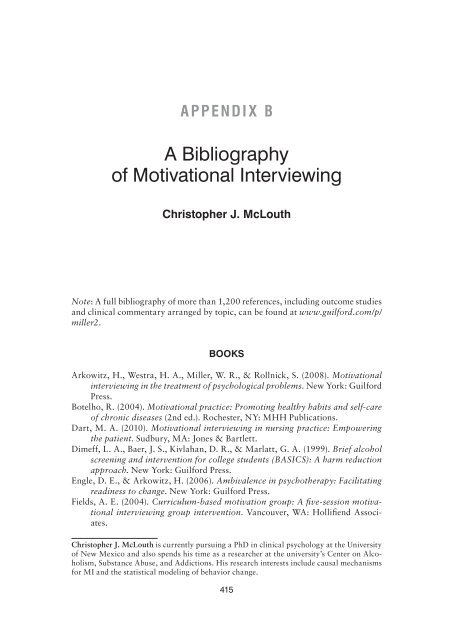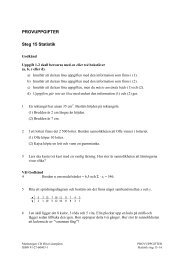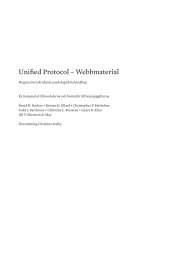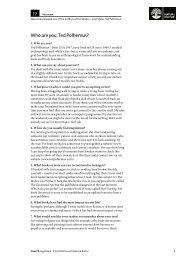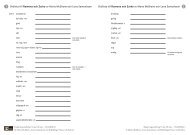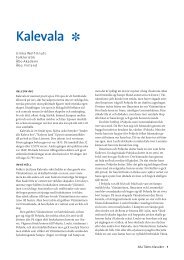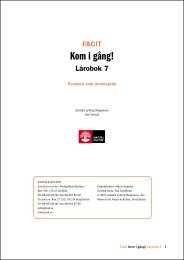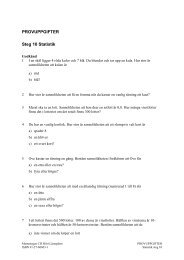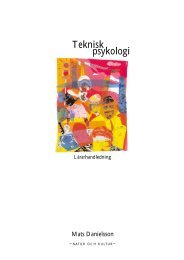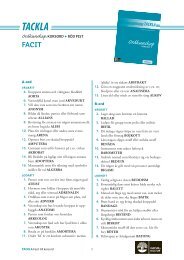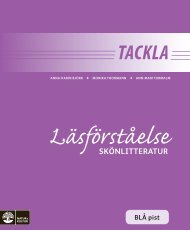A Bibliography of Motivational Interviewing
A Bibliography of Motivational Interviewing
A Bibliography of Motivational Interviewing
Create successful ePaper yourself
Turn your PDF publications into a flip-book with our unique Google optimized e-Paper software.
Appendix B: <strong>Bibliography</strong> 417Rollnick, S., Miller, W. R., & Butler, C. C. (2008). <strong>Motivational</strong> interviewing inhealth care: Helping patients change behavior. New York: Guilford Press.Rosengren, D. B. (2009). Building motivational interviewing skills: A practitionerworkbook. New York: Guilford Press.Schmidt, U., & Treasure, J. (1997). Clinician’s guide to getting better bit(e) bybit(e): A survival kit for sufferers <strong>of</strong> bulimia nervosa and binge eating disorders.Hove, UK: Psychology Press.Tober, G., & Raistrick, D. (2007). <strong>Motivational</strong> dialogue: Preparing addictionpr<strong>of</strong>essionals for motivational interviewing practice. New York: Routledge.Tomlin, K. M., & Richardson, R. (2004). <strong>Motivational</strong> interviewing and stages <strong>of</strong>change: Integrating best practices for substance abuse pr<strong>of</strong>essionals. CenterCity, MN: Hazelden.Walters, S. T., & Baer, J. S. (2005). Talking with college students about alcohol:<strong>Motivational</strong> strategies for reducing abuse. New York: Guilford Press.Walters, S. T., Clark, M. D., Gingerich, R., & Meltzer, M. L. (2007). Motivating<strong>of</strong>fenders to change: A guide for probation and parole. Washington, DC:National Institute <strong>of</strong> Corrections, U.S. Dept. <strong>of</strong> Justice.Weinstein, P. (2002). Motivate your dental patients: A workbook. Seattle, University<strong>of</strong> Washington. Available from the author: philw@u.washington.edu.Wolf, S. (2009). Retaining addicted and HIV infected clients in treatment services.Saärbrucken, Germany: VDM Verlag.SYSTEMATIC REVIEWS† Indicates studies that include a statistical meta- analysis.† Apodaca, T. R., & Longabaugh, R. (2009). Mechanisms <strong>of</strong> change in motivationalinterviewing: A review and preliminary evaluation <strong>of</strong> the evidence.Addiction, 104(5), 705–715.† Armstrong, M. J., Mottershead, T. A., Ronksley, P. E., Sigal, R. J., Campbell,T. S., & Hemmelgarn, B. R. (2011). <strong>Motivational</strong> interviewing to improveweight loss in overweight and/or obese patients: A systematic review and metaanalysis<strong>of</strong> randomized controlled trials. Obesity Reviews, 12(9), 709–723.Baker, A., & Hambridge, J. (2002). <strong>Motivational</strong> interviewing: Enhancing engagementin treatment for mental health problems. Behaviour Change, 19(3),138–145.Baker, A., & Lee, N. K. (2003). A review <strong>of</strong> psychosocial interventions for amphetamineuse. Drug and Alcohol Review, 22(3), 323–335.Baker, A., Turner, A., Kay- Lambkin, F. J., & Lewin, T. J. (2009). The long and theshort <strong>of</strong> treatments for alcohol or cannabis misuse among people with severemental disorders. Addictive Behaviors, 34(10), 852–858.Barkh<strong>of</strong>, E., De Haan, L., Meijer, C. J., Fouwels, A. J., Keet, I. P. M., Hulstijn, K.P., et al. (2006). <strong>Motivational</strong> interviewing in psychotic disorders. CurrentPsychiatry Reviews, 2(2), 207–213.Barnett, N. P., Tevyaw, T. O’L., Fromme, K., Borsari, B., Carey, K. B., Corbin, W.
418 Appendix B: <strong>Bibliography</strong>R., et al. (2004). Brief alcohol interventions with mandated or adjudicatedcollege students. Alcoholism: Clinical and Experimental Research, 28(6),966–975.Bechdolf, A., Pohlmann, B., Geyer, C., Ferber, C., Klosterkotter, J., & Gouzoulis-Mayfrank, E. (2005). [<strong>Motivational</strong> interviewing for patients with comorbidschizophrenia and substance abuse disorders: A review]. Fortschritte derNeurologie- Psychiatrie, 73(12), 728–735.Bernstein, E., & Bernstein, J. (2008). Effectiveness <strong>of</strong> alcohol screening and briefmotivational intervention in the emergency department setting. Annals <strong>of</strong>Emergency Medicine, 51(6), 751–754.Bien, T. H., Miller, W. R., & Tonigan, J. S. (1993). Brief interventions for alcoholproblems: A review. Addiction, 88(3), 315–335.Branscum, P., & Sharma, M. (2010). A review <strong>of</strong> motivational interviewing-basedinterventions targeting problematic drinking among college students. AlcoholismTreatment Quarterly, 28(1), 63–77.Britt, E., Blampied, N., & Hudson, S. (2003). <strong>Motivational</strong> interviewing: A review.Australian Psychologist, 38(3), 193–201.Britt, E., Hudson, S. M., & Blampied, N. M. (2004). <strong>Motivational</strong> interviewing inhealth settings: A review. Patient Education and Counseling, 53(2), 147–155.Burke, B. L. (2011). What can motivational interviewing do for you? Cognitive andBehavioral Practice, 18(1), 74–81.† Burke, B. L., Arkowitz, H., & Menchola, M. (2003). The efficacy <strong>of</strong> motivationalinterviewing: A meta- analysis <strong>of</strong> controlled clinical trials. Journal <strong>of</strong> Consultingand Clinical Psychology, 71(5), 843–861.† Burke, B. L., Dunn, C. W., Atkins, D. C., & Phelps, J. S. (2004). The emergingevidence base for motivational interviewing: A meta- analytic and qualitativeinquiry. Journal <strong>of</strong> Cognitive Psychotherapy, 18(4), 309–322.Bux, D. A., Jr., & Irwin, T. W. (2006). Combining motivational interviewing andcognitive- behavioral skills training for the treatment <strong>of</strong> crystal methamphetamineabuse/dependence. Journal <strong>of</strong> Gay and Lesbian Psychotherapy, 10(3–4), 143–152.Carroll, K. M. (2005). Recent advances in the psychotherapy <strong>of</strong> addictive disorders.Current Psychiatry Reports, 7(5), 329–336.Chambless, D. L., & Ollendick, T. H. (2001). Empirically supported psychologicalinterventions: Controversies and evidence. Annual Review <strong>of</strong> Psychology, 52,685–716.Chanut, F., Brown, T. G., & Dongier, M. (2005). <strong>Motivational</strong> interviewing andclinical psychiatry. Canadian Journal <strong>of</strong> Psychiatry, 50(9), 548–554.Chanut, F., Brown, T. G., & Donguier, M. (2005). <strong>Motivational</strong> interviewing andclinical psychiatry. Canadian Journal <strong>of</strong> Psychiatry, 50(11), 715–721.Cleary, M., Hunt, G. E., Matheson, S., & Walter, G. (2009). Psychosocial treatmentsfor people with co- occurring severe mental illness and substancemisuse: Systematic review. Journal <strong>of</strong> Advanced Nursing, 65(2), 238–258.† Cleary, M., Hunt, G. E., Matheson, S. L., Siegfried, N., & Walter, G. (2008).Psychosocial interventions for people with both severe mental illness and substancemisuse. Cochrane Database <strong>of</strong> Systematic Reviews (1).Cloud, R. N., Besel, K., Bledsoe, L., Golder, S., McKiernan, P., Patterson, D.,et al. (2006). Adapting motivational interviewing strategies to increase
Appendix B: <strong>Bibliography</strong> 419posttreatment 12-step meeting attendance. Alcoholism Treatment Quarterly,24(3), 31–53.Cooperman, N. A., & Arnsten, J. H. (2005). <strong>Motivational</strong> interviewing for improvingadherence to antiretroviral medications. Current HIV/AIDS Reports,2(4), 159–164.Cummings, S. M., Cooper, R. L., & Cassie, K. M. (2009). <strong>Motivational</strong> interviewingto affect behavioral change in older adults. Research on Social WorkPractice, 19(2), 195–204.Deas, D. (2008). Evidence-cased treatments for alcohol use disorders in adolescents.Pediatrics, 121, S348–S354.Deas, D., & Clark, A. (2009). Current state <strong>of</strong> treatment for alcohol and other druguse disorders in adolescents. Alcohol Research and Health, 32(1), 76–82.Demmel, R. (2001). <strong>Motivational</strong> <strong>Interviewing</strong>: Ein Literaturüberblick. Sucht:Zeitschrift für Wissenschaft und Praxis, 47(3), 171–188.DiClemente, C. C., Marinilli, A. S., Singh, M., & Bellino, L. E. (2001). The role<strong>of</strong> feedback in the process <strong>of</strong> health behavior change. American Journal <strong>of</strong>Health Behavior, 25(3), 217–227.† DiRosa, L. C. (2010). <strong>Motivational</strong> interviewing to treat overweight/obesity: Ameta- analysis <strong>of</strong> relevant research. Unpublished doctoral dissertation, WilmingtonUniversity, New Castle, Delaware.Drymalski, W. M., & Campbell, T. C. (2009). A review <strong>of</strong> motivational interviewingto enhance adherence to antipsychotic medication in patients with schizophrenia:Evidence and recommendations. Journal <strong>of</strong> Mental Health, 18(1),6–15.Dunn, C. (2003). Brief motivational interviewing interventions targeting substanceabuse in the acute care medical setting. Seminars in Clinical Neuropsychiatry,8(3), 188–196.† Dunn, C., Deroo, L., & Rivara, F. P. (2001). The use <strong>of</strong> brief interventionsadapted from motivational interviewing across behavioral domains: A systematicreview. Addiction, 96(12), 1725–1742.Duran, L. S. (2003). Motivating health: Strategies for the nurse practitioner. Journal<strong>of</strong> the American Academy <strong>of</strong> Nurse Practitioners, 15(5), 200–205.Erickson, S. J., Gerstle, M., & Feldstein, S. W. (2005). Brief interventions andmotivational interviewing with children, adolescents, and their parents inpediatric health care settings: A review. Archives <strong>of</strong> Pediatrics and AdolescentMedicine, 159(12), 1173–1180.Feldstein, S. W., & Ginsburg, J. I. D. (2006). <strong>Motivational</strong> interviewing with duallydiagnosed adolescents in juvenile justice settings. Brief Treatment and CrisisIntervention, 6(3), 218–233.† Gooding, P., & Tarrier, N. (2009). A systematic review and meta- analysis <strong>of</strong>cognitive- behavioural interventions to reduce problem gambling: Hedgingour bets? Behaviour Research and Therapy, 47(7), 592–607.Grenard, J. L., Ames, S. L., Pentz, M. A., & Sussman, S. (2006). <strong>Motivational</strong>interviewing with adolescents and young adults for drug- related problems.International Journal <strong>of</strong> Adolescent Medicine and Health, 18(1), 53–67.† Grimshaw, G. M., & Stanton, A. (2006). Tobacco cessation interventions foryoung people. Cochrane Database <strong>of</strong> Systematic Reviews (4), CD003289.
420 Appendix B: <strong>Bibliography</strong>Handmaker, N. S., & Wilbourne, P. (2001). <strong>Motivational</strong> interventions in prenatalclinics. Alcohol Research and Health, 25(3), 219–229.† Hettema, J., Steele, J., & Miller, W. R. (2005). <strong>Motivational</strong> interviewing.Annual Review <strong>of</strong> Clinical Psychology, 1, 91–111.† Hettema, J. E. (2007). A meta- analysis <strong>of</strong> motivational interviewing acrossbehavioral domains. Unpublished doctoral dissertation, University <strong>of</strong> NewMexico, Albuquerque.Hjorthøj, C., Fohlmann, A., & Nordent<strong>of</strong>t, M. (2009). Treatment <strong>of</strong> cannabis usedisorders in people with schizophrenia spectrum disorders—A systematicreview. Addictive Behaviors, 34(6–7), 520–525.Horsfall, J., Cleary, M., Hunt, G. E., & Walter, G. (2009). Psychosocial treatmentsfor people with co- occurring severe mental illnesses and substance usedisorders (dual diagnosis): A review <strong>of</strong> empirical evidence. Harvard Review<strong>of</strong> Psychiatry, 17(1), 24–34.Ilott, R. (2005). Does compliance therapy improve use <strong>of</strong> antipsychotic medication?British Journal <strong>of</strong> Community Nursing, 10(11), 514–519.† Jensen, C. D., Cushing, C. C., Aylward, B. S., Craig, J. T., Sorell, D. M., & Steele,R. G. (2011). Effectiveness <strong>of</strong> motivational interviewing interventions for adolescentsubstance use behavior change: A meta- analytic review. Journal <strong>of</strong>Consulting and Clinical Psychology, 79(4), 433–440.Julius, R. J., Novitsky, M. A., Jr., & Dubin, W. R. (2009). Medication adherence:A review <strong>of</strong> the literature and implications for clinical practice. Journal <strong>of</strong>Psychiatric Practice, 15(1), 34–44.Kaplan, A. S. (2002). Psychological treatments for anorexia nervosa: A review <strong>of</strong>published studies and promising new directions. Canadian Journal <strong>of</strong> Psychiatry,47(3), 235–242.† Kelly, T. M., Daley, D. C., & Douaihy, A. B. (2011). Treatment <strong>of</strong> substanceabusing patients with comorbid psychiatric disorders. Addictive Behaviors,37(1), 11–24.Kienast, T., & Heinz, A. (2005). Therapy and supportive care <strong>of</strong> alcoholics: Guidelinesfor practitioners. Digestive Diseases, 23(3–4), 304–309.Knight, K. M., McGowan, L., Dickens, C., & Bundy, C. (2006). A systematicreview <strong>of</strong> motivational interviewing in physical health care settings. BritishJournal <strong>of</strong> Health Psychology, 11(2), 319–332.Laker, C. J. (2007). How reliable is the current evidence looking at the efficacy <strong>of</strong>harm reduction and motivational interviewing interventions in the treatment<strong>of</strong> patients with a dual diagnosis? Journal <strong>of</strong> Psychiatric and Mental HealthNursing, 14(8), 720–726.Larimer, M. E., & Cronce, J. M. (2007). Identification, prevention, and treatmentrevisited: Individual- focused college drinking prevention strategies 1999–2006. Addictive Behaviors, 32(11), 2439–2468.Lawendowski, L. A. (1998). A motivational intervention for adolescent smokers.Preventive Medicine, 27(5, Pt. 2), A39–A46.Lewis, S. W., Tarrier, N., & Drake, R. J. (2005). Integrating non-drug treatmentsin early schizophrenia. British Journal <strong>of</strong> Psychiatry, 187(Suppl. 48), s65–s71.Lewis, T. F., & Osborn, C. J. (2004). Solution- focused counseling and motivationalinterviewing: A consideration <strong>of</strong> confluence. Journal <strong>of</strong> Counseling andDevelopment, 82(1), 38–48.
Appendix B: <strong>Bibliography</strong> 421† Lopez, L. M., Tolley, E. E., Grimes, D. A., & Chen-Mok, M. (2009). Theorybasedinterventions for contraception. Cochrane Database <strong>of</strong> SystematicReviews (1), CD007249.Lopez- Bushnell, K., & Fassler, C. (2004). Nursing care <strong>of</strong> hospitalized medicalpatients with addictions. Journal <strong>of</strong> Addictions Nursing, 15(4), 177–182.† Lundahl, B., & Burke, B. L. (2009). The effectiveness and applicability <strong>of</strong> motivationalinterviewing: A practice- friendly review <strong>of</strong> four meta- analyses. Journal<strong>of</strong> Clinical Psychology, 65(11), 1232–1245.† Lundahl, B. W., Kunz, C., Brownell, C., Tollefson, D., & Burke, B. L. (2010).A meta- analysis <strong>of</strong> motivational interviewing: Twenty-five years <strong>of</strong> empiricalstudies. Research on Social Work Practice, 20(2), 137–160.Macgowan, M. J., & Engle, B. (2010). Evidence for optimism: Behavior therapiesand motivational interviewing in adolescent substance abuse treatment. Childand Adolescent Psychiatric Clinics <strong>of</strong> North America, 19(3), 527–545.Madson, M. B., & Campbell, T. C. (2006). Measures <strong>of</strong> fidelity in motivationalenhancement: A systematic review. Journal <strong>of</strong> Substance Abuse Treatment,31(1), 67–73.Madson, M. B., Loignon, A. C., & Lane, C. (2009). Training in motivational interviewing:A systematic review. Journal <strong>of</strong> Substance Abuse Treatment, 36(1),101–109.Martins, R. K., & McNeil, D. W. (2009). Review <strong>of</strong> motivational interviewingin promoting health behaviors. Clinical Psychology Review, 29(4), 283–293.McCollum, E. E., Trepper, T. S., & Smock, S. (2003). Solution- focused grouptherapy for substance abuse: Extending competency-based models. Journal <strong>of</strong>Family Psychotherapy, 14(4), 27–42.McMurran, M. (2009). <strong>Motivational</strong> interviewing with <strong>of</strong>fenders: A systematicreview. Legal and Criminological Psychology, 14(1), 83–100.Miller, W. R. (1985). Motivation for treatment: A review with special emphasis onalcoholism. Psychological Bulletin, 98(1), 84–107.Miller, W. R. (1996). <strong>Motivational</strong> interviewing: Research, practice, and puzzles.Addictive Behaviors, 21(6), 835–842.Miller, W. R. (2000). Rediscovering fire: Small interventions, large effects. Psychology<strong>of</strong> Addictive Behaviors, 14(1), 6–18.Miller, W. R. (2004). <strong>Motivational</strong> interviewing in service to health promotion.American Journal <strong>of</strong> Health Promotion, 18(3), 1–10.Miller, W. R. (2005). <strong>Motivational</strong> interviewing and the incredible shrinking treatmenteffect. Addiction, 100(4), 421.Miller, W. R., & Wilbourne, P. L. (2002). Mesa Grande: A methodological analysis<strong>of</strong> clinical trials <strong>of</strong> treatments for alcohol use disorders. Addiction, 97(3),265–277.Noonan, W. C., & Moyers, T. B. (1997). <strong>Motivational</strong> interviewing. Journal <strong>of</strong>Substance Misuse: For Nursing, Health and Social Care, 2(1), 8–16.† Osborn, L. D. (2007). A meta- analysis <strong>of</strong> controlled clinical trials <strong>of</strong> the efficacy<strong>of</strong> motivational interviewing in a dual- diagnosis population. Unpublisheddoctoral dissertation, The Wright Institute, Berkeley, California.Perney, P., Rigole, H., & Blanc, F. (2008). [Alcohol dependence: Diagnosis andtreatment]. Revue de Medecine Interne, 29(4), 297–304.RachBeisel, J., Scott, J., & Dixon, L. (1999). Co- occurring severe mental illness
422 Appendix B: <strong>Bibliography</strong>and substance use disorders: A review <strong>of</strong> recent research. Psychiatric Services,50(11), 1427–1434.Resnicow, K., DiIorio, C., Soet, J. E., Borrelli, B., Hecht, J., & Ernst, D. (2002).<strong>Motivational</strong> interviewing in health promotion: It sounds like something ischanging. Health Psychology, 21(5), 444–451.Rollnick, S., & Miller, W. R. (1995). What is motivational interviewing? Behaviouraland Cognitive Psychotherapy, 23(4), 325–334.† Rubak, S., Sandbaek, A., Lauritzen, T., & Christensen, B. (2005). <strong>Motivational</strong>interviewing: A systematic review and meta- analysis. British Journal <strong>of</strong> GeneralPractice, 55(513), 305–312.Rush, B. R., Dennis, M. L., Scott, C. K., Castel, S., & Funk, R. R. (2008). Theinteraction <strong>of</strong> co- occurring mental disorders and recovery managementcheckups on substance abuse treatment participation and recovery. EvaluationReview, 32(1), 7–38.Ryder, D. (1999). Deciding to change: Enhancing client motivation to changebehaviour. Behaviour Change, 16(3), 165–174.Schmidt, P., Kohler, J., & Soyka, M. (2008). [Evidence-based treatments in theinpatient rehabilitation <strong>of</strong> alcoholics]. Fortschr Neurol Psychiatr, 76(2),86–90.Sindelar, H. A., Abrantes, A. M., Hart, C., Lewander, W., & Spirito, A. (2004).<strong>Motivational</strong> interviewing in pediatric practice. Current Problems in Pediatricand Adolescent Health Care, 34(9), 322–339.† Smedslund, G., Berg, R. C., Hammerstrom, K. T., Steiro, A., Leiknes, K. A.,Dahl, H. M., et al. (2011). <strong>Motivational</strong> interviewing for substance abuse.Cochrane Database <strong>of</strong> Systematic Reviews (5).Smith, A. J., Shepherd, J. P., & Hodgson, R. J. (1998). Brief interventions forpatients with alcohol- related trauma. British Journal <strong>of</strong> Oral and Maxill<strong>of</strong>acialSurgery, 36(6), 408–415.Söderlund, L. L., Madson, M. B., Rubak, S., & Nilsen, P. (2011). A systematicreview <strong>of</strong> motivational interviewing training for general health care practitioners.Patient Education and Counseling, 84(1), 16–26.† Tait, R. J., & Hulse, G. K. (2003). A systematic review <strong>of</strong> the effectiveness <strong>of</strong>brief interventions with substance using adolescents by type <strong>of</strong> drug. Drugand Alcohol Review, 22(3), 337–346.Tevyaw, T. O’L., & Monti, P. M. (2004). <strong>Motivational</strong> enhancement and otherbrief interventions for adolescent substance abuse: Foundations, applications,and evaluations. Addiction, 99(Suppl. 2), 63–75.Thompson, D. R., Chair, S. Y., Chan, S. W., Astin, F., Davidson, P. M., & Ski, C.F. (2011). <strong>Motivational</strong> interviewing: A useful approach to improving cardiovascularhealth? Journal <strong>of</strong> Clinical Nursing, 20(9/10), 1236–1244.VanWormer, J. J., & Boucher, J. L. (2004). <strong>Motivational</strong> interviewing and dietmodification: A review <strong>of</strong> the evidence. The Diabetes Educator, 30(3), 404–406, 408–410, 414–406, passim.† Vasilaki, E. I., Hosier, S. G., & Cox, W. M. (2006). The efficacy <strong>of</strong> motivationalinterviewing as a brief intervention for excessive drinking: A meta- analyticreview. Alcohol and Alcoholism, 41(3), 328–335.Wagner, C. C., & McMahon, B. T. (2004). <strong>Motivational</strong> interviewing and
Appendix B: <strong>Bibliography</strong> 423rehabilitation counseling practice. Rehabilitation Counseling Bulletin, 47(3),152–161.† Wilbourne, P. L. (2005). An empirical basis for the treatment <strong>of</strong> alcohol problems.Unpublished doctoral dissertation, University <strong>of</strong> New Mexico, Albuquerque.Yevlahova, D., & Satur, J. (2009). Models for individual oral health promotionand their effectiveness: A systematic review. Australian Dental Journal, 54(3),190–197.Zygmunt, A., Olfson, M., Boyer, C. A., & Mechanic, D. (2002). Interventions toimprove medication adherence in schizophrenia. American Journal <strong>of</strong> Psychiatry,159(10), 1653–1664.TRAININGAdams, J., & Madson, M. (2007). Reflection and outlook for the future <strong>of</strong> addictionstreatment and training: An interview with William R. Miller. Journal <strong>of</strong>Teaching in the Addictions, 5(1), 95–109.Ager, R., Roahen- Harrison, S., Toriello, P. J., Kissinger, P., Morse, P., Morse,E., et al. (2011). Predictors <strong>of</strong> adopting motivational enhancement therapy.Research on Social Work Practice, 21(1), 65–76.Alexander, M., VanBenschoten, S. W., & Walters, S. T. (2008). <strong>Motivational</strong> interviewingtraining in criminal justice: Development <strong>of</strong> a model plan. FederalProbation, 72(2), 61–66.Amrhein, P. C., Miller, W. R., Yahne, C., Knupsky, A., & Hochstein, D. (2004).Strength <strong>of</strong> client commitment language improves with therapist training inmotivational interviewing. Alcoholism: Clinical and Experimental Research,28(5), 74A.Arthur, D. (1999). Assessing nursing students’ basic communication and interviewingskills: The development and testing <strong>of</strong> a rating scale. Journal <strong>of</strong> AdvancedNursing, 29(3), 658–665.Baer, J. S., Rosengren, D. B., Dunn, C. W., Wells, E. A., Ogle, R. L., & Hartzler,B. (2004). An evaluation <strong>of</strong> workshop training in motivational interviewingfor addiction and mental health clinicians. Drug and Alcohol Dependence,73(1), 99–106.Baer, J. S., Wells, E. A., Rosengren, D. B., Hartzler, B., Beadnell, B., & Dunn, C.(2009). Agency context and tailored training in technology transfer: A pilotevaluation <strong>of</strong> motivational interviewing training for community counselors.Journal <strong>of</strong> Substance Abuse Treatment, 37(2), 191–202.Ball, S., Bachrach, K., DeCarlo, J., Farentinos, C., Keen, M., McSherry, T., et al.(2002). Characteristics, beliefs and practices <strong>of</strong> community clinicians trainedto provide manual- guided therapy for substance abusers. Journal <strong>of</strong> SubstanceAbuse Treatment, 23(4), 309–318.Bell, K., & Cole, B. A. (2008). Improving medical students’ success in promotinghealth behavior change: A curriculum evaluation. Journal <strong>of</strong> General InternalMedicine, 23(9), 1503–1506.Bennett, G. A., Moore, J., Vaughan, T., Rouse, L., Gibbins, J. A., Thomas, P.,
424 Appendix B: <strong>Bibliography</strong>et al. (2007). Strengthening motivational interviewing skills following initialtraining: A randomized trial <strong>of</strong> workplace-based reflective practice. AddictiveBehaviors, 32(12), 2963–2975.Britt, E., & Blampied, N. M. (2010). <strong>Motivational</strong> interviewing training: A pilotstudy <strong>of</strong> the effects on practitioner and patient behaviour. Behavioural andCognitive Psychotherapy, 38(2), 239–244.Broers, S., Smets, E., Bindels, P., Evertsz, F. B., Calff, M., & de Haes, H. (2005).Training general practitioners in behavior change counseling to improveasthma medication adherence. Patient Education and Counseling, 58(3),279–287.Brown, R. L., & Oriel, K. (1998). Teaching motivational interviewing to first-yearstudents. Academic Medicine, 73(5), 589–590.Brown, R. L., Pfeifer, J. M., Gjerde, C. L., Seibert, C. S., & Haq, C. L. (2004).Teaching patient- centered tobacco intervention to first-year medical students.Journal <strong>of</strong> General Internal Medicine, 19(5), 534–539.Burke, P. J., Da Silva, J. D., Vaughan, B. L., & Knight, J. R. (2005). Training highschool counselors on the use <strong>of</strong> motivational interviewing to screen for substanceabuse. Substance Abuse, 26(3–4), 31–34.Carise, D., Brooks, A., Alterman, A., McLellan, A. T., Hoover, V., & Forman,R. (2009). Implementing evidence-based practices in community treatmentprograms: Initial feasibility <strong>of</strong> a counselor “toolkit.” Substance Abuse, 30(3),239–243.Carpenter, K. M., Watson, J. M., Raffety, B., & Chabal, C. (2003). Teaching briefinterventions for smoking cessations via an interactive computer-based tutorial.Journal <strong>of</strong> Health Psychology, 8(1), 149–160.Casey, D. (2007). Using action research to change health- promoting practice.Nursing and Health Sciences, 9(1), 5–13.D’Ambrosio, R., Laws, K. E., Gabriel, R. M., Hromco, J., & Kelly, P. (2006).Implementing motivational interviewing in a non-MI world: A MI knowledgeadoption study. Journal <strong>of</strong> Teaching in the Addictions, 5(2), 21–37.Doherty, Y., Hall, D., James, P. T., Roberts, S. H., & Simpson, J. (2000). Changecounselling in diabetes: The development <strong>of</strong> a training programme for thediabetes team. Patient Education and Counseling, 40(3), 263–278.Evangeli, M., Engelbrecht, S.-K., Swartz, L., Turner, K., Forsberg, L., & Soka, N.(2009). An evaluation <strong>of</strong> a brief motivational interviewing training course forHIV/AIDS counsellors in Western Cape Province, South Africa. AIDS Care,21(2), 189–196.Fitzgerald, N., Watson, H., McCaig, D., & Stewart, D. (2009). Developing andevaluating training for community pharmacists to deliver interventions onalcohol issues. Pharmacy World and Science, 31(2), 149–153.Forrester, D., McCambridge, J., Waissbein, C., Emlyn-Jones, R., & Rollnick,S. (2008). Child risk and parental resistance: Can motivational interviewingimprove the practice <strong>of</strong> child and family social workers in working withparental alcohol misuse? British Journal <strong>of</strong> Social Work, 38(7), 1302–1319.Forsberg, L., Ernst, D., & Farbring, C. (2011). Learning motivational interviewingin a real-life setting: A randomised controlled trial in the Swedish PrisonService. Criminal Behaviour and Mental Health, 21(3), 177–188.Forsberg, L., Forsberg, L. G., Lindqvist, H., & Helgason, A. R. (2010). Clinician
Appendix B: <strong>Bibliography</strong> 425acquisition and retention <strong>of</strong> motivational interviewing skills: A two-and-ahalf-yearexploratory study. Substance Abuse Treatment, Prevention, andPolicy, 5(8).Goggin, K., Hawes, S. M., Duval, E. R., Spresser, C. D., Martinez, D. A., Lynam,I., et al. (2010). A motivational interviewing course for pharmacy students.American Journal <strong>of</strong> Pharmaceutical Education, 74(4).Haeseler, F., Fortin, A. H., Pfeiffer, C., Walters, C., & Martino, S. (2011). Assessment<strong>of</strong> a motivational interviewing curriculum for year 3 medical studentsusing a standardized patient case. Patient Education and Counseling, 84(1),27–30.Handmaker, N. S., Hester, R. K., & Delaney, H. D. (1999). Videotaped training inalcohol counseling for obstetric care practitioners: A randomized controlledtrial. Obstetrics and Gynecology, 93(2), 213–218.Hartzler, B., Beadnell, B., Rosengren, D. B., Dunn, C., & Baer, J. S. (2010). Deconstructingpr<strong>of</strong>iciency in motivational interviewing: Mechanics <strong>of</strong> skillful practitionerdelivery during brief simulated encounters. Behavioural and CognitivePsychotherapy, 38(5), 611–628.Hohman, M., Doran, N., & Koutsenok, I. (2009). <strong>Motivational</strong> interviewing trainingfor juvenile correctional staff in California: One year initial outcomes.Journal <strong>of</strong> Offender Rehabilitation, 48(7), 635–648.Koerber, A., Crawford, J., & O’Connell, K. (2003). The effects <strong>of</strong> teaching dentalstudents brief motivational interviewing for smoking- cessation counseling: Apilot study. Journal <strong>of</strong> Dental Education, 67(4), 439–447.Kralikova, E., Bonevski, B., Stepankova, L., Pohlova, L., & Mladkova, N. (2009).Postgraduate medical education on tobacco and smoking cessation in Europe.Drug and Alcohol Review, 28(5), 474–483.Lane, C., Hood, K., & Rollnick, S. (2008). Teaching motivational interviewing:Using role play is as effective as using simulated patients. Medical Education,42(6), 637–644.Lane, C., Johnson, S., Rollnick, S., Edwards, K., & Lyons, M. (2003). Consultingabout lifestyle change: Evaluation <strong>of</strong> a training course for specialist diabetesnurses. Practical Diabetes International, 20(6), 204–208.Lozano, P., McPhillips, H. A., Hartzler, B., Robertson, A. S., Runkle, C., Scholz,K. A., et al. (2010). Randomized trial <strong>of</strong> teaching brief motivational interviewingto pediatric trainees to promote healthy behaviors in families. Archives <strong>of</strong>Pediatrics and Adolescent Medicine, 164(6), 561–566.MacLeod, J. B. A., Hungerford, D. W., Dunn, C., & Hartzler, B. (2008). Evaluation<strong>of</strong> training <strong>of</strong> surgery interns to perform brief alcohol interventionsfor trauma patients. Journal <strong>of</strong> the American College <strong>of</strong> Surgeons, 207(5),639–645.Madson, M. B., Loignon, A. C., & Lane, C. (2009). Training in motivational interviewing:A systematic review. Journal <strong>of</strong> Substance Abuse Treatment, 36(1),101–109.Martino, S., Ball, S. A., Nich, C., Canning-Ball, M., Rounsaville, B. J., & Carroll,K. M. (2011). Teaching community program clinicians motivationalinterviewing using expert and train-the- trainer strategies. Addiction, 106(2),428–441.Martino, S., Canning-Ball, M., Carroll, K. M., & Rounsaville, B. J. (2011). A
426 Appendix B: <strong>Bibliography</strong>criterion-based stepwise approach for training counselors in motivationalinterviewing. Journal <strong>of</strong> Substance Abuse Treatment, 40(4), 357–365.Martino, S., Haeseler, F., Belitsky, R., Pantalon, M., & Fortin, A. H., IV. (2007).Teaching brief motivational interviewing to year three medical students. MedicalEducation, 41(2), 160–167.Mastroleo, N. R., Turrisi, R., Carney, J. V., Ray, A. E., & Larimer, M. E. (2010).Examination <strong>of</strong> posttraining supervision <strong>of</strong> peer counselors in a motivationalenhancement intervention to reduce drinking in a sample <strong>of</strong> heavy- drinkingcollege students. Journal <strong>of</strong> Substance Abuse Treatment, 39(3), 289–297.Miller, W. R., & Mount, K. A. (2001). A small study <strong>of</strong> training in motivationalinterviewing: Does one workshop change clinician and client behavior?Behavioural and Cognitive Psychotherapy, 29(4), 457–471.Miller, W. R., & Moyers, T. B. (2006). Eight stages in learning motivational interviewing.Journal <strong>of</strong> Teaching in the Addictions, 5(1), 3–17.Miller, W. R., Moyers, T. B., Arciniega, L., Ernst, D., & Forcehimes, A. A. (2005).Training, supervision and quality monitoring <strong>of</strong> the COMBINE study behavioralinterventions. Journal <strong>of</strong> Studies on Alcohol, 66(Suppl. 15), S188–S195.Miller, W. R., Yahne, C. E., Moyers, T. B., Martinez, J., & Pirritano, M. (2004). Arandomized trial <strong>of</strong> methods to help clinicians learn motivational interviewing.Journal <strong>of</strong> Consulting and Clinical Psychology, 72(6), 1050–1062.Mitcheson, L., Bhavsar, K., & McCambridge, J. (2009). Randomized trial <strong>of</strong> trainingand supervision in motivational interviewing with adolescent drug treatmentpractitioners. Journal <strong>of</strong> Substance Abuse Treatment, 37(1), 73–78.Mounsey, A. L., Bovbjerg, V., White, L., & Gazewood, J. (2006). Do studentsdevelop better motivational interviewing skills through role-play with standardizedpatients or with student colleagues? Medical Education, 40(8),775–780.Moyers, T. B., Manuel, J. K., Wilson, P. G., Hendrickson, S. M. L., Talcott, W., &Durand, P. (2008). A randomized trial investigating training in motivationalinterviewing for behavioral health providers. Behavioural and Cognitive Psychotherapy,36(2), 149–162.Moyers, T. B., Martin, T., Manuel, J. K., Hendrickson, S. M., & Miller, W. R.(2005). Assessing competence in the use <strong>of</strong> motivational interviewing. Journal<strong>of</strong> Substance Abuse Treatment, 28(1), 19–26.Opheim, A., Andreasson, S., Eklund, A. B., & Prescott, P. (2009). The effects<strong>of</strong> training medical students in motivational interviewing. Health EducationJournal, 68(3), 170–178.Periasamy, S. (2005). The relationship between the fidelity <strong>of</strong> motivational interviewingand nutritional outcomes in African American church populations.Unpublished doctoral dissertation, Georgia State University, Atlanta.Poirier, M. K., Clark, M. M., Cerhan, J. H., Pruthi, S., Geda, Y. E., & Dale, L. C.(2004). Teaching motivational interviewing to first-year medical students toimprove counseling skills in health behavior change. Mayo Clinic Proceedings,79(3), 327–331.Rollnick, S., Kinnersley, P., & Butler, C. (2002). Context-bound communicationskills training: Development <strong>of</strong> a new method. Medical Education, 36(4),377–383.Roman, B., Borges, N., & Morrison, A. K. (2011). Teaching motivational
Appendix B: <strong>Bibliography</strong> 427interviewing skills to third-year psychiatry clerkship students. Academic Psychiatry,35(1), 51–53.Rubak, S., Sandbaek, A., Lauritzen, T., Borch- Johnsen, K., & Christensen, B.(2006). An education and training course in motivational interviewing influence:GPs’ pr<strong>of</strong>essional behaviour—ADDITION Denmark. British Journal <strong>of</strong>General Practice, 56(527), 429–436.Rubel, E. C., Sobell, L. C., & Miller, W. R. (2000). Do continuing educationworkshops improve participants’ skills? Effects <strong>of</strong> a motivational interviewingworkshop on substance-abuse counselors’ skills and knowledge. BehaviorTherapist, 23(4), 73–77, 90.Runkle, C., Osterholm, A., Hoban, R., McAdam, E., & Tull, R. (2000). Briefnegotiation program for promoting behavior change: The Kaiser Permanenteapproach to continuing pr<strong>of</strong>essional development. Education for Health,13(3), 377–386.Scal, P., Hennrikus, D., Ehrlich, L., Ireland, M., & Borowsky, I. (2004). Preparingresidents to counsel about smoking. Clinical Pediatrics, 43(8), 703–708.Schoener, E. P., Madeja, C. L., Henderson, M. J., Ondersma, S. J., & Janisse, J. J.(2006). Effects <strong>of</strong> motivational interviewing training on mental health therapistbehavior. Drug and Alcohol Dependence, 82(3), 269–275.Schumacher, J. A., Madson, M. B., & Norquist, G. S. (2011). Using telehealthtechnology to enhance motivational interviewing training for rural substanceabuse treatment providers: A services improvement project. Behavior Therapist,34(4), 64–70.Sepulveda, A. R., Lopez, C., Macdonald, P., & Treasure, J. (2008). Feasibility andacceptability <strong>of</strong> DVD and telephone coaching-based skills training for carers<strong>of</strong> people with an eating disorder. International Journal <strong>of</strong> Eating Disorders,41(4), 318–325.Shafer, M. S., Rhode, R., & Chong, J. (2004). Using distance education to promotethe transfer <strong>of</strong> motivational interviewing skills among behavioral health pr<strong>of</strong>essionals.Journal <strong>of</strong> Substance Abuse Treatment, 26(2), 141–148.Smith, J. L., Amrhein, P. C., Brooks, A. C., Carpenter, K. M., Levin, D., Schreiber,E. A., et al. (2007). Providing live supervision via teleconferencing improvesacquisition <strong>of</strong> motivational interviewing skills after workshop attendance.American Journal <strong>of</strong> Drug and Alcohol Abuse, 33(1), 163–168.Sobell, L. C., Manor, H. L., Sobell, M. B., & Dum, M. (2008). Self- critiques <strong>of</strong>audiotaped therapy sessions: A motivational procedure for facilitating feedbackduring supervision. Training and Education in Pr<strong>of</strong>essional Psychology,2(3), 151–155.Söderlund, L. L. (2008). Learning motivational interviewing: Exploring primaryhealth care nurses’ training and counselling experiences. Health EducationJournal, 67(2), 102–109.Söderlund, L. L., Madson, M. B., Rubak, S., & Nilsen, P. (2011). A systematicreview <strong>of</strong> motivational interviewing training for general health care practitioners.Patient Education and Counseling, 84(1), 16–26.Söderlund, L. L., & Nilsen, P. (2009). Feasibility <strong>of</strong> using motivational interviewingin a Swedish pharmacy setting. International Journal <strong>of</strong> Pharmacy Practice,17(3), 143–149.Stott, N. C. H., Rees, M., Rollnick, S., Pill, R. M., & Hackett, P. (1996).
428 Appendix B: <strong>Bibliography</strong>Pr<strong>of</strong>essional responses to innovation in clinical method: Diabetes care andnegotiating skills. Patient Education and Counseling, 29(1), 67–73.Tober, G., Godfrey, C., Parrott, S., Copello, A., Farrin, A., Hodgson, R., et al.(2005). Setting standards for training and competence: The UK alcohol treatmenttrial. Alcohol and Alcoholism, 40(5), 413–418.van Eijk- Hustings, Y. J., Daemen, L., Schaper, N. C., & Vrijhoef, H. J. (2011).Implementation <strong>of</strong> motivational interviewing in a diabetes care managementinitiative in the Netherlands. Patient Education and Counseling, 84(1),10–15.Velasquez, M. M., Hecht, J., Quinn, V. P., Emmons, K. M., DiClemente, C. C., &Dolan- Mullen, P. (2000). Application <strong>of</strong> motivational interviewing to prenatalsmoking cessation: Training and implementation issues. Tobacco Control,9(Suppl. 3), iii36–iii40.Villaume, W. A., Berger, B. A., & Barker, B. N. (2006). Learning motivationalinterviewing: Scripting a virtual patient. American Journal <strong>of</strong> PharmaceuticalEducation, 70(2), 33.White, L. L., Gazewood, J. D., & Mounsey, A. L. (2007). Teaching students behaviorchange skills: Description and assessment <strong>of</strong> a new motivational interviewingcurriculum. Medical Teacher, 29(4), e67–e71.Wilson, G. T., & Schlam, T. R. (2004). The transtheoretical model and motivationalinterviewing in the treatment <strong>of</strong> eating and weight disorders. ClinicalPsychology Review, 24(3), 361–378.PROCESS RESEARCHAmrhein, P. C., Miller, W. R., Yahne, C., Knupsky, A., & Hochstein, D. (2004).Strength <strong>of</strong> client commitment language improves with therapist training inmotivational interviewing. Alcoholism: Clinical and Experimental Research,28(5), 74A.Amrhein, P. C., Miller, W. R., Yahne, C. E., Palmer, M., & Fulcher, L. (2003). Clientcommitment language during motivational interviewing predicts drug useoutcomes. Journal <strong>of</strong> Consulting and Clinical Psychology, 71(5), 862–878.Baer, J. S., Beadnell, B., Garrett, S. B., Hartzler, B., Wells, E. A., & Peterson, P.L. (2008). Adolescent change language within a brief motivational interventionand substance use outcomes. Psychology <strong>of</strong> Addictive Behaviors, 22(4),570–575.Barsky, A., & Coleman, H. (2001). Evaluating skill acquisition in motivationalinterviewing: The development <strong>of</strong> an instrument to measure practice skills.Journal <strong>of</strong> Drug Education, 31(1), 69–82.Boardman, T., Catley, D., Grobe, J. E., Little, T. D., & Ahluwalia, J. S. (2006).Using motivational interviewing with smokers: Do therapist behaviors relateto engagement and therapeutic alliance? Journal <strong>of</strong> Substance Abuse Treatment,31(4), 329–339.Campbell, S. D., Adamson, S. J., & Carter, J. D. (2010). Client language duringmotivational enhancement therapy and alcohol use outcome. Behavioural andCognitive Psychotherapy, 38(4), 399–415.Catley, D., Harris, K. J., Mayo, M. S., Hall, S., Okuyemi, K. S., Boardman, T., et al.
Appendix B: <strong>Bibliography</strong> 429(2006). Adherence to principles <strong>of</strong> motivational interviewing and client withinsessionbehavior. Behavioural and Cognitive Psychotherapy, 34(1), 43–56.Collins, S. E., Carey, K. B., & Smyth, J. (2005). Relationships <strong>of</strong> linguistic andmotivation variables with drinking outcomes following two mailed briefinterventions. Journal <strong>of</strong> Studies on Alcohol, 66(4), 526–535.Dunn, C., Droesch, R. M., Johnston, B. D., & Rivara, F. P. (2004). <strong>Motivational</strong>interviewing with injured adolescents in the emergency department:In- session predictors <strong>of</strong> change. Behavioural and Cognitive Psychotherapy,32(1), 113–116.Ernst, D. B. (2008). <strong>Motivational</strong> interviewing and health coaching: A quantitativeand qualitative exploration <strong>of</strong> integration. Unpublished doctoral dissertation,University <strong>of</strong> New Mexico, Albuquerque.Faris, A. S. (2007). Examining process variables in a motivational interventionfor college student drinkers. Unpublished doctoral dissertation, University <strong>of</strong>Arkansas, Fayetteville.Flores-Ferrán, N. (2010). An examination <strong>of</strong> mitigation strategies used in Spanishpsychotherapeutic discourse. Journal <strong>of</strong> Pragmatics, 42(7), 1964–1981.Forrester, D., Kershaw, S., Moss, H., & Hughes, L. (2008). Communication skillsin child protection: How do social workers talk to parents? Child and FamilySocial Work, 13(1), 41–51.Gaume, J., Bertholet, N., Faouzi, M., Gmel, G., & Daeppen, J.-B. (2010). Counselormotivational interviewing skills and young adult change talk articulationduring brief motivational interventions. Journal <strong>of</strong> Substance AbuseTreatment, 39(3), 272–281.Gaume, J., Gmel, G., & Daeppen, J.-B. (2008). Brief alcohol interventions: Docounsellors’ and patients’ communication characteristics predict change?Alcohol and Alcoholism, 43(1), 62–62.Gaume, J., Gmel, G., Faouzi, M., & Daeppen, J.-B. (2008). Counsellor behavioursand patient language during brief motivational interventions: A sequentialanalysis <strong>of</strong> speech. Addiction, 103(11), 1793–1800.Gaume, J., Gmel, G., Faouzi, M., & Daeppen, J. B. (2009). Counselor skill influencesoutcomes <strong>of</strong> brief motivational interventions. Journal <strong>of</strong> SubstanceAbuse Treatment, 37(2), 151–159.Glynn, L. H., & Moyers, T. B. (2010). Chasing change talk: The clinician’s rolein evoking client language about change. Journal <strong>of</strong> Substance Abuse Treatment,39(1), 65–70.Hallgren, K. A., & Moyers, T. B. (2011). Does readiness to change predict insessionmotivational language? Correspondence between two conceptualizations<strong>of</strong> client motivation. Addiction, 106(7), 1261–1269.Hodgins, D. C., Ching, L. E., & McEwen, J. (2009). Strength <strong>of</strong> commitmentlanguage in motivational interviewing and gambling outcomes. Psychology <strong>of</strong>Addictive Behaviors, 23(1), 122–130.Imel, Z. E., Baer, J. S., Martino, S., Ball, S. A., & Carroll, K. M. (2011). Mutualinfluence in therapist competence and adherence to motivational enhancementtherapy. Drug and Alcohol Dependence, 115(3), 229–236.Karno, M. P., & Longabaugh, R. (2005). Less directiveness by therapists improvesdrinking outcomes <strong>of</strong> reactant clients in alcoholism treatment. Journal <strong>of</strong>Consulting and Clinical Psychology, 73(2), 262–267.
430 Appendix B: <strong>Bibliography</strong>Karno, M. P., Longabaugh, R., & Herbeck, D. (2009). Patient reactance as a moderator<strong>of</strong> the effect <strong>of</strong> therapist structure on posttreatment alcohol use. Journal<strong>of</strong> Studies on Alcohol and Drugs, 70(6), 929–936.Karno, M. P., Longabaugh, R., & Herbeck, D. (2010). What explains the relationshipbetween the therapist structure × patient reactance interaction and drinkingoutcome? An examination <strong>of</strong> potential mediators. Psychology <strong>of</strong> AddictiveBehaviors, 24(4), 600–607.Lee, C. S., Baird, J., Longabaugh, R., Nirenberg, T. D., Mello, M. J., & Woolard,R. (2010). Change plan as an active ingredient <strong>of</strong> brief motivational interventionsfor reducing negative consequences <strong>of</strong> drinking in hazardous drinkingemergency- department patients. Journal <strong>of</strong> Studies on Alcohol and Drugs,71(5), 726–733.Martin, T., Christopher, P. J., Houck, J. M., & Moyers, T. B. (2011). The structure<strong>of</strong> client language and drinking outcomes in project match. Psychology <strong>of</strong>Addictive Behaviors, 25(3), 439–445.Martino, S., Ball, S. A., Nich, C., Frankforter, T. L., & Carroll, K. M. (2008).Community program therapist adherence and competence in motivationalenhancement therapy. Drug and Alcohol Dependence, 96(1–2), 37–48.McCambridge, J., Day, M., Thomas, B. A., & Strang, J. (2011). Fidelity to motivationalinterviewing and subsequent cannabis cessation among adolescents.Addictive Behaviors, 36(7), 749–754.Moyers, T. B., & Martin, T. (2006). Therapist influence on client language duringmotivational interviewing sessions. Journal <strong>of</strong> Substance Abuse Treatment,30(3), 245–251.Moyers, T. B., Martin, T., Christopher, P. J., Houck, J. M., Tonigan, J. S., &Amrhein, P. C. (2007). Client language as a mediator <strong>of</strong> motivational interviewingefficacy: Where is the evidence? Alcoholism: Clinical and ExperimentalResearch, 31(Suppl. S3), 40S–47S.Moyers, T. B., Martin, T., Houck, J. M., Christopher, P. J., & Tonigan, J. S. (2009).From in- session behaviors to drinking outcomes: A causal chain for motivationalinterviewing. Journal <strong>of</strong> Consulting and Clinical Psychology, 77(6),1113–1124.Moyers, T. B., Miller, W. R., & Hendrickson, S. M. (2005). How does motivationalinterviewing work?: Therapist interpersonal skill predicts client involvementwithin motivational interviewing sessions. Journal <strong>of</strong> Consulting and ClinicalPsychology, 73(4), 590–598.Naar-King, S., Outlaw, A., Green-Jones, M., Wright, K., & Parsons, J. T. (2009).<strong>Motivational</strong> interviewing by peer outreach workers: A pilot randomizedclinical trial to retain adolescents and young adults in HIV care. AIDS Care,21(7), 868–873.Pierson, H. M., Hayes, S. C., Gifford, E. V., Roget, N., Padilla, M., Bissett, R., etal. (2007). An examination <strong>of</strong> the motivational interviewing treatment integritycode. Journal <strong>of</strong> Substance Abuse Treatment, 32(1), 11–17.Pollak, K. I., Alexander, S. C., C<strong>of</strong>fman, C. J., Tulsky, J. A., Lyna, P., Dolor, R. J.,et al. (2010). Physician communication techniques and weight loss in adults:Project CHAT. American Journal <strong>of</strong> Preventive Medicine, 39(4), 321–328.Pollak, K. I., Alexander, S. C., Østbye, T., Lyna, P., Tulsky, J. A., Dolor, R. J., etal. (2009). Primary care physicians’ discussions <strong>of</strong> weight- related topics with
Appendix B: <strong>Bibliography</strong> 431overweight and obese adolescents: Results from the Teen CHAT Pilot Study.Journal <strong>of</strong> Adolescent Health, 45(2), 205–207.Pollak, K. I., Østbye, T., Alexander, S. C., Gradison, M., Bastian, L. A., Brouwer,R. J. N., et al. (2007). Empathy goes a long way in weight loss discussions.Journal <strong>of</strong> Family Practice, 56(12), 1031–1036.Santa Ana, E. J., Carroll, K. M., Anez, L., Paris, M., Jr., Ball, S. A., Nich, C., etal. (2009). Evaluating motivational enhancement therapy adherence and competenceamong Spanish- speaking therapists. Drug and Alcohol Dependence,103(1–2), 44–51.Strang, J., & McCambridge, J. (2004). Can the practitioner correctly predict outcomein motivational interviewing? Journal <strong>of</strong> Substance Abuse Treatment,27(1), 83–88.Tappin, D. M., McKay, C., McIntyre, D., Gilmour, W. H., Cowan, S., Crawford,F., et al. (2000). A practical instrument to document the process <strong>of</strong> motivationalinterviewing. Behavioural and Cognitive Psychotherapy, 28(1), 17–32.Thrasher, A. D., Golin, C. E., Earp, J. A. L., Tien, H., Porter, C., & Howie, L.(2006). <strong>Motivational</strong> interviewing to support antiretroviral therapy adherence:The role <strong>of</strong> quality counseling. Patient Education and Counseling,62(1), 64–71.Thyrian, J. R., Freyer-Adam, J., Hannover, W., Roske, K., Mentzel, F., Kufeld,C., et al. (2007). Adherence to the principles <strong>of</strong> motivational interviewing,clients’ characteristics and behavior outcome in a smoking cessation andrelapse prevention trial in women postpartum. Addictive Behaviors, 32(10),2297–2303.Tollison, S. J., Lee, C. M., Neighbors, C., Neil, T. A., Olson, N. D., & Larimer,M. E. (2008). Questions and reflections: The use <strong>of</strong> motivational interviewingmicroskills in a peer-led brief alcohol intervention for college students. BehaviorTherapy, 39(2), 183–194.Vader, A. M., Walters, S. T., Prabhu, G. C., Houck, J. M., & Field, C. A. (2010).The language <strong>of</strong> motivational interviewing and feedback: Counselor language,client language, and client drinking outcomes. Psychology <strong>of</strong> AddictiveBehaviors, 24(2), 190–197.Walker, D., Stephens, R., Rowland, J., & R<strong>of</strong>fman, R. (2011). The influence <strong>of</strong>client behavior during motivational interviewing on marijuana treatment outcome.Addictive Behaviors, 36(6), 669–673.THEORETICAL COMMENTARYAmrhein, P. C. (2004). How does motivational interviewing work? What clienttalk reveals. Journal <strong>of</strong> Cognitive Psychotherapy, 18(4), 323–336.Bricker, J., & Tollison, S. (2011). Comparison <strong>of</strong> motivational interviewing withacceptance and commitment therapy: A conceptual and clinical review.Behavioural and Cognitive Psychotherapy, 39(5), 541–559.Britton, P. C., Patrick, H., Wenzel, A., & Williams, G. C. (2011). Integrating motivationalinterviewing and self- determination theory with cognitive behavioraltherapy to prevent suicide. Cognitive and Behavioral Practice, 18(1), 16–27.Cheng, M. K. S. (2007). New approaches for creating the therapeutic alliance:
432 Appendix B: <strong>Bibliography</strong>Solution- focused interviewing, motivational interviewing, and the medicationinterest model. Psychiatric Clinics <strong>of</strong> North America, 30(2), 157–166.Christopher, P. J., & Dougher, M. J. (2009). A behavior- analytic account <strong>of</strong> motivationalinterviewing. Behavior Analyst, 32(1), 149–161.Draycott, S., & Dabbs, A. (1998). Cognitive dissonance. 2: A theoretical grounding<strong>of</strong> motivational interviewing. British Journal <strong>of</strong> Clinical Psychology,37(3), 355–364.Faris, A. S., Cavell, T. A., Fishburne, J. W., & Britton, P. C. (2009). Examiningmotivational interviewing from a client agency perspective. Journal <strong>of</strong> ClinicalPsychology, 65(9), 955–970.Frankel, Z. e., & Levitt, H. (2006). Postmodern strategies for working with resistance:Problem resolution or self- revolution? Journal <strong>of</strong> Constructivist Psychology,19(3), 219–250.Gache, P., Fortini, C., Meynard, A., Reiner Meylan, M., & Sommer, J. (2006).[<strong>Motivational</strong> interviewing: Some theoretical aspects and some practical exercises].Revue Medicale Suisse, 2(80), 2154, 2156–2162.Gerber, S., & Basham, A. (1999). Responsive therapy and motivational interviewing:Postmodernist paradigms. Journal <strong>of</strong> Counseling and Development,77(4), 418–422.Leffingwell, T. R., Neumann, C. A., Babitzke, A. C., Leedy, M. J., & Walters, S. T.(2007). Social psychology and motivational interviewing: A review <strong>of</strong> relevantprinciples and recommendations for research and practice. Behavioural andCognitive Psychotherapy, 35(1), 31–45.Markland, D., Ryan, R. M., Tobin, V. J., & Rollnick, S. (2005). <strong>Motivational</strong>interviewing and self- determination theory. Journal <strong>of</strong> Social and ClinicalPsychology, 24(6), 811–831.Miller, J. H., & Moyers, T. B. (2002). <strong>Motivational</strong> interviewing in substanceabuse: Applications for occupational medicine. Occupational Medicine,17(1), 51–65.Miller, W. R. (1983). <strong>Motivational</strong> interviewing with problem drinkers. BehaviouralPsychotherapy, 11(2), 147–172.Miller, W. R. (1994). <strong>Motivational</strong> interviewing: III. On the ethics <strong>of</strong> motivationalintervention. Behavioural and Cognitive Psychotherapy, 22(2), 111–123.Miller, W. R. (1995). The ethics <strong>of</strong> motivational interviewing revisited. Behaviouraland Cognitive Psychotherapy, 23(4), 345–348.Miller, W. R. (2000). <strong>Motivational</strong> interviewing: IV. Some parallels with horsewhispering. Behavioural and Cognitive Psychotherapy, 28(3), 285–292.Miller, W. R., & Rollnick, S. (2004). Talking oneself into change: <strong>Motivational</strong>interviewing, stages <strong>of</strong> change, and therapeutic process. Journal <strong>of</strong> CognitivePsychotherapy, 18(4), 299–308.Miller, W. R., & Rose, G. S. (2009). Toward a theory <strong>of</strong> motivational interviewing.American Psychologist, 64(6), 527–537.Moos, R. H. (2007). Theory-based active ingredients <strong>of</strong> effective treatments forsubstance use disorders. Drug and Alcohol Dependence, 88(2–3), 109–121.Moyers, T. B. (2004). History and happenstance: How motivational interviewinggot its start. Journal <strong>of</strong> Cognitive Psychotherapy, 18(4), 291–298.Moyers, T. B., & Rollnick, S. (2002). A motivational interviewing perspective onresistance in psychotherapy. Journal <strong>of</strong> Clinical Psychology, 58(2), 185–193.
Appendix B: <strong>Bibliography</strong> 433Muscat, A. C. (2005). Ready, set, go: The transtheoretical model <strong>of</strong> change andmotivational interviewing for “fringe” clients. Journal <strong>of</strong> Employment Counseling,42(4), 179–192.Newnham-Kanas, C., Morrow, D., & Irwin, J. D. (2010). <strong>Motivational</strong> coaching:A functional juxtaposition <strong>of</strong> three methods for health behaviour change:<strong>Motivational</strong> interviewing, coaching, and skilled helping. International Journal<strong>of</strong> Evidence Based Coaching and Mentoring, 8(2), 27–48.Putnam, S. M. (2002). Changing health behaviors through the medical interview.Epidemiologia e Psichiatria Sociale, 11(4), 218–225.Ryan, R. M., Lynch, M. F., Vansteenkiste, M., & Deci, E. L. (2011). Motivationand autonomy in counseling, psychotherapy, and behavior change: A look attheory and practice. Counseling Psychologist, 39(2), 193–260.Scheel, M. J. (2011). Client common factors represented by client motivation andautonomy. Counseling Psychologist, 39(2), 276–285.Seager, M. (1995). Healing psychology’s own motivational conflicts: A commenton Miller’s “Ethics <strong>of</strong> <strong>Motivational</strong> Intervention.” Behavioural and CognitivePsychotherapy, 23(4), 341–343.Sheldon, K. M. (2003). Reconciling humanistic ideals and scientific clinical practice.Clinical Psychology: Science and Practice, 10(3), 302.Stanton, M. (2010). <strong>Motivational</strong> interviewing and the social context. AmericanPsychologist, 65(4), 297–298.Vansteenkiste, M., & Sheldon, K. M. (2006). There’s nothing more practical thana good theory: Integrating motivational interviewing and self- determinationtheory. British Journal <strong>of</strong> Clinical Psychology, 45(1), 63–82.Velasquez, M., von Sternberg, K., Dodrill, C., Kan, L., & Parsons, J. (2005). Thetranstheoretical model as a framework for developing substance abuse interventions.Journal <strong>of</strong> Addictions Nursing, 16(1), 31–40.Wagner, C. C., & Ingersoll, K. S. (2008). Beyond cognition: Broadening the emotionalbase <strong>of</strong> motivational interviewing. Journal <strong>of</strong> Psychotherapy Integration,18(2), 191–206.Weegmann, M. (2002). <strong>Motivational</strong> interviewing and addiction: A psychodynamicappreciation. Psychodynamic Practice: Individuals, Groups andOrganisations, 8(2), 179–195.


